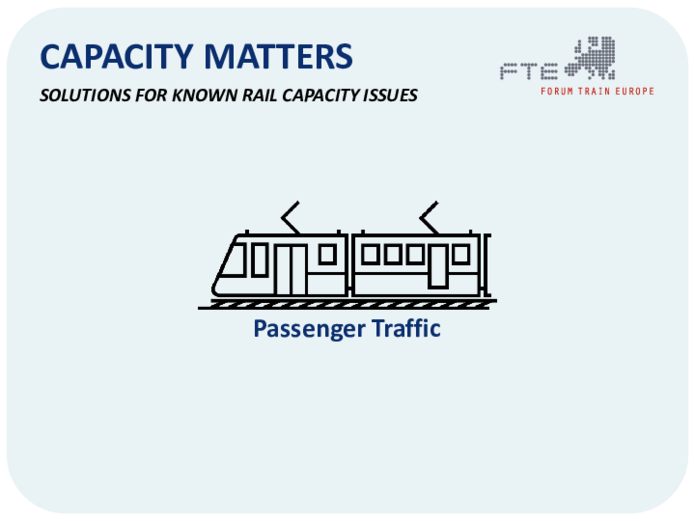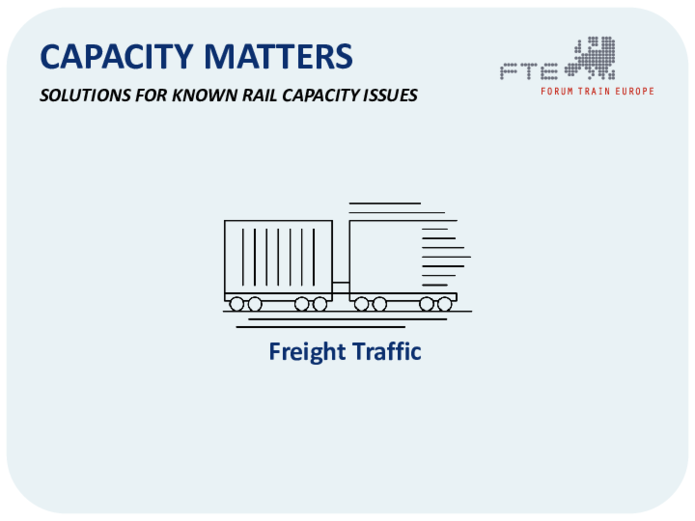This page gives overview of different positions of FTE members and inputs towards the TTR programme. You can find three different type of documents:
FTE Position Papers
Reason why
- Law revision: The European Commission (EC) states that one of the main drivers of today’s «insufficient competitiveness of rail transport (…)» and «limited growth potential of rail services (...)» is «ineffective management of capacity on the existing network (…)» (Quotes from EC’s call for evidence, 7.3.22). With the methodology of an Impact Assessment the EC started this year the process of the revision of the Capacity Management Regulation.
- With different initiatives by Infrastructure Managers (IM), Railway Undertakings (RU) currently see the risk of an unharmonized interpretation of the future capacity management process by IMs, which will lead to severe business problems, such as no capacity in line with market-needs, increased handling costs for RUs in cross-border traffic, high costs due to unfitting IT provided by IMs etc.
Goals
The main aim of the position papers is to give guidance and input to the impact assessment from a market perspective. Therefore, the primary target audience of the papers are the Impact Assessors and the DG Move. The papers shall also address IMs and RNE to promote a harmonized and market oriented TTR implementation.
Why Position Papers by FTE?
FTE unites business experts from 86 Railway Undertakings (RUs) from Freight and Passenger traffic dealing with capacity management. Its main goal is to improve the usability of infrastructure capacity through the whole planning and allocation process.
How have the papers been established?
The contents were developed with experts from numerous RUs with the perspective of improvements for the entire sector. A pan-European perspective was taken and compromises between freight and passenger traffic had to be found. The papers were adopted in FTE working groups. As they reflect the market/RU-view, addressing issues on the IM side, an endorsement of CER is not possible. FTE made in collaboration with CER sure that the papers do not contradict any existing CER-paper.
On what evidence are the positions based?
The background of the positions is based on evidence provided by most FTE members in freight and passenger traffic, covering large parts of Europe. This includes experience with existing capacity management as well as recent or new national initiatives by IMs.
Overview of the approved and shared Position Papers
Topic (date) | Summary content | |
Plenary Assembly (PA) statement on Capacity Management (6/2021) | It is a general call to IMs and RNE to increase the efforts in the implementation of the market-oriented capacity management process which is planned with TTR (timetable and capacity redesign): Earlier and reliable TCR-planning (Temporary Capacity restrictions) Earlier and stable path offers for Passenger customers Capacity for short-term requests for Freight customers Harmonized and efficient processes and their execution between IMs Avoiding “hybrid” situation when implementing the new process Constant learning/improvements | |
Incentives for all actors; «Commercial conditions» (3/2022) Aligned with ERFA and Allrail | Commercial conditions regulate the financial incentives in case of cancellation or alteration of an ordered/confirmed train path. This paper is a call for market-oriented Commercial conditions, meaning: Reciprocity (incentives also for IMs for reliable timetables) Bearable fees Simple, fair and transparent mechanism Harmonised timeline and mechanism | |
| Common Ground on Commercial Conditions, 6/2022; Aligned with RNE | Subsequently to the RU postion paper, RNE and FTE agreed on a common basic understanding. This shall serve as the foundation for establishing Commercial Conditions and has been agreed by the RNE General Assembly May 2022 and the FTE Plenary Assembly June 2022. | |
International Body for compliance (3/2022) Aligned with ERFA and Allrail | This paper is a call for improved international alignment by IMs as already legally required and an independent international escalation mechanism to support RUs to enforce the alignment. National escalation is established via national Regulatory Bodies, whereas international escalation is left to RUs, with no independent actor supporting. In conflicts concerning processes, EU law or missing alignment of cross-border capacity, every stakeholder shall be able to turn to an international escalation level. | |
Response to «Call for evidence» (4/2022) | The official response of FTE to the EC welcomes the approach with potential adaption of the capacity management regulation. Furthermore, FTE collected and orchestrated input to show evidence for a law revision. | |
Temporary Capacity Restrictions (05/2022) Aligned with ERFA and Allrail | This is a call to improve the inclusion of RUs in the planning of TCRs. Currently TCRs are optimized in relation to IM/ Ministry Budgets instead of transport streams or train runs. RUs have several requirements to IMs to ensure an early and stable TCR-planning, including the «RUN» aspect, meaning the finding of solutions for the affected trains. | |
Providing the Capacity the market needs Aligned with ERFA and Allrail | This paper is a call to IMs to improve and align processes to offer market-oriented capacity to the customers at the time it is needed. It is also a call not to maximise the usage of capacity at the expense of market needs. Some traffic needs early stable timetables, some need to have flexibility until close to the day of operation. Path ordering timelines must be according to this customer needs. IMs shall involve RUs in a constant, iterative market dialogue to create suitable solutions. Why: RUs lose market and money if not suitable capacity is made available – currently it seems that some IMs interpret the new capacity process TTR not in a market-oriented way. | |
Common Management Understanding on Market Input to Advance Capacity Planning Aligned with RNE, 07/2023 | With first Capacity Management steps as defined in the TTR programme now being brought to life and with an extensive legal framework on this subject being drafted by the European Commission, RNE and FTE take the opportunity to clearer define
in the Advance Capacity Management process. As first step of this deep dive, both associations’ managements agree on a basic framework for this important development. This document provides experts and other stakeholders a first insight into this development and an outlook on the items to be tackled. Download Common Management Understanding on Market Input to Advance Capacity Planning | |
Creating a single European rail capacity market Aligned with ERFA and Allrail | This paper is a call to overcome national particularities and different standards to allow seamless and market-oriented domestic and cross-border traffic. RUs ask IMs and policy makers for the implementation of a real single European rail capacity market, without specific national standards. IMs need to act «as if they were one» towards the RUs. Why: national particularities make the planning and operation of trains more difficult and costly and hinder the quality of cross-border train services, e.g. with longer transport times and lower punctuality. | |
Efficient digitalisation to support European rail capacity management Aligned with ERFA and Allrail | This paper is a call to IMs to have an efficient IT landscape, aligned across Europe, making no difference between national and international traffic, covering all capacities and all process steps using existing (TAF and TAP TSI) standards. It is also a call to have market-oriented response times for path requests. Why: As long as national specifics exist, RUs need to invest in IT for every network/IM they operate on. | |
| FTE Analysis on the proposed capacity management Regulation | FTE has undertaken a diligent analysis of the proposed capacity management Regulation. The insights and recommendations provided by FTE members were collaboratively formulated during the most recent joint meeting of the Working Groups for Passenger, Freight, and IT. Download FTE Analysis on capacity management Regulation
|
Evidence Input to the Impact Assessment
FTE members have collected data, evidence and business needs for the purposes of revision of EU Regulation 913/2010. The "Input documents" were provided to the consultants contracted by the European Commission for the purpose of the supporting impact assessment creation.
Name | Covered areas |
Download the Input to the Impact Assessment (Further Evidence) v1.1 | Shares of traffic suitable for Rolling Planning - need for safeguarded capacity Shares of traffic suitable for Rolling Planning - need for mulit-annual capacity commitment Evidence on curent timeline for ticket sales - and why not earlier Need for tailor-made and flexiblity in pre-planning Missing clarity on congestions - lines that are congested, but only "unofficially" |

